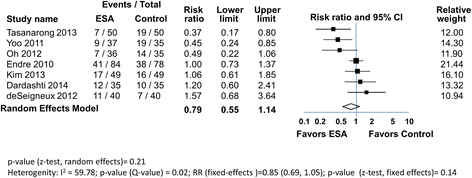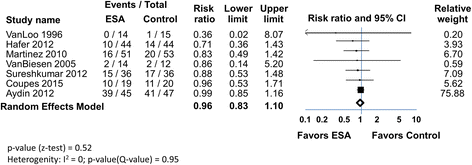Erythropoiesis stimulating agents and reno-protection: a meta-analysis
- PMID: 28077085
- PMCID: PMC5225567
- DOI: 10.1186/s12882-017-0438-4
Erythropoiesis stimulating agents and reno-protection: a meta-analysis
Abstract
Background: Erythropoiesis stimulating agents (ESAs) were proposed to enhance survival of renal tissues through direct effects via activation of EPO receptors on renal cells resulting in reduced cell apoptosis, or indirect effects via increased oxygen delivery due to increased numbers of Hb containing red blood cells. Thus through several mechanisms there may be benefit of ESA administration on kidney disease progression and kidney function in renal patients. However conflicting ESA reno-protection outcomes have been reported in both pre-clinical animal studies and human clinical trials. To better understand the potential beneficial effects of ESAs on renal-patients, meta-analyses of clinical trials is needed.
Methods: Literature searches and manual searches of references lists from published studies were performed. Controlled trials that included ESA treatment on renal patients with relevant renal endpoints were selected.
Results: Thirty two ESA controlled trials in 3 categories of intervention were identified. These included 7 trials with patients who had a high likelihood of AKI, 7 trials with kidney transplant patients and 18 anemia correction trials with chronic kidney disease (predialysis) patients. There was a trend toward improvement in renal outcomes in the ESA treated arm of AKI and transplant trials, but none reached statistical significance. In 12 of the anemia correction trials, meta-analyses showed no difference in renal outcomes with the anemia correction but both arms received some ESA treatment making it difficult to assess effects of ESA treatment alone. However, in 6 trials the low Hb arm received no ESAs and meta-analysis also showed no difference in renal outcomes, consistent with no benefit of ESA/ Hb increase.
Conclusions: Most ESA trials were small with modest event rates. While trends tended to favor the ESA treatment arm, these meta-analyses showed no reduction of incidence of AKI, no reduction in DGF or improvement in 1-year graft survival after renal transplantation and no significant delay in progression of CKD. These results do not support significant clinical reno-protection by ESAs.
Keywords: AKI (acute kidney injury); Anemia; Clinical trial; EPO; ESA; Erythropoietin; Meta-analysis; Progression of CKD; Reno-protection; Tissue protection; Transplant.
Figures






References
Publication types
MeSH terms
Substances
LinkOut - more resources
Full Text Sources
Other Literature Sources
Medical
Research Materials

